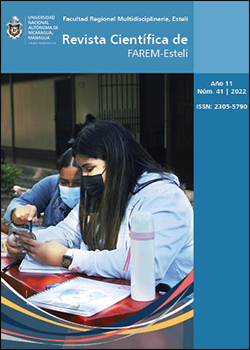Features of the formation process of the Master in Professional Pedagogy in the University of Holguin, Cuba
DOI:
https://doi.org/10.5377/farem.v11i41.13889Keywords:
Features, formation, Master, professional pedagogyAbstract
Professional Pedagogy is the branch of General Pedagogy that studies the initial or continuous professional formation process of the worker. This process manifests singular features, which are understood and explained from the categories that emerge from the theoretical and methodological postulates of Professional Pedagogy and Didactic Technical Sciences. This worker is formed in an integration of the academic, labor, and research, in a dynamic that articulates the instruction, education and professional growth and in a concrete historical-cultural context that suggests the manifestation of a relationship between the university and the world of work. It is for this reason, that the professional who prepare himself as a Master in Professional Pedagogy is a higher-level worker who is a protagonist in a process of continuous formation in a conscious, structured and with specific features in his formation. It is from this perspective that this article gathers the results of a documentary research on the features that have characterized the formation process of the Master in Professional Pedagogy in the University of Holguin, Cuba. The general objective and main result of the study is the determination of the regularities and tendencies that have characterized the historical evolution of the formation process of this professional in the referred institution.
Downloads
331
HTML (Español (España)) 138
Published
How to Cite
Issue
Section
License
Copyright (c) 2022 Revista Científica de la FAREM-Estelí

This work is licensed under a Creative Commons Attribution-NonCommercial-ShareAlike 4.0 International License.
© Revista Científica de FAREM-Estelí

